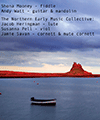May
Musical venture brings old traditions to life

The oldest known fiddler's tune book from the North of England has inspired a new CD featuring Newcastle University staff and graduates.
The disc, Northumbrian Exchanges: Exploring Common Ground(s) between Folk and Early Music, is the result of a project funded by the Arts & Humanities Research Council, involving two very different groups of musicians.
Fiddle player Shona Mooney and guitarist Andy Watt, rising stars and recent Newcastle graduates, are representing folk and traditional music. They are joined by the Northern Early Music Collective (the University’s Ensemble in Residence), consisting of lutenist Jacob Heringman, viol player Susanna Pell and Newcastle lecturer and cornettist Jamie Savan. They bring together some of the world’s leading practitioners in the field of historically-informed performance.
The CD explores the similarities between folk and early music and features fresh interpretations of traditional folk tunes, early music classics and a new composition by Newcastle University graduate Matthew Rowan.
Featured on the CD is a selection of work from Henry Atkinson’s Manuscript, the oldest known fiddle tune book in the North which dates back to 1694. Henry Atkinson lived in Hartburn, Northumberland, and his book features over 200 tunes of varying styles.
Dr Jamie Savan, head of performance at Newcastle University, said: “Our premise is that the further back we look into music history, the more blurred the distinctions between classical, art music, folk and traditional music become. Henry Atkinson’s Manuscript contains a fascinating mixture of styles. It is a snapshot of the eclectic and genre-defying taste of a musician in the North East of England in the final decade of the seventeenth century and it was the inspiration for our collaboration.
“Working together was very exciting for us. Classical performers tend to focus very much on the music as written on the page, but in earlier repertoire there is so much left unwritten – ornaments that the performers were expected to add, and variations on the melodies that would have been improvised – and it is these unwritten aspects that really bring the music to life. We can learn something about these techniques by reading historical documents, but folk musicians have a more instinctive approach to these issues, drawing on a living oral tradition extending back through many generations. Being able to share our knowledge and expertise, perform together and make this recording has been a fantastic experience.”
The CD was made as part of the Northumbrian Exchanges project, which supports rural arts in Northumberland and encourages communities to become involved in them.
Northumbrian Exchanges: Exploring Common Ground(s) between Folk and Early Music will be available from 2 June. More information at the Northern Early Music Collective website, where you can also listen to samples from the CD.
published on: 30 May 2014
